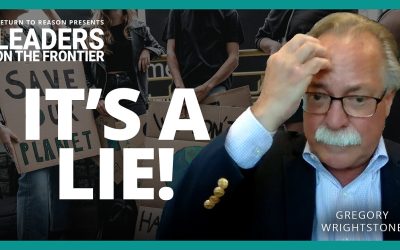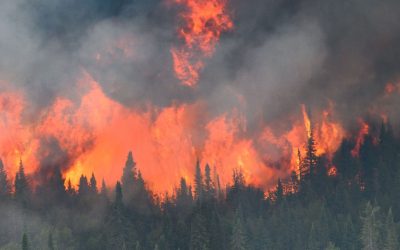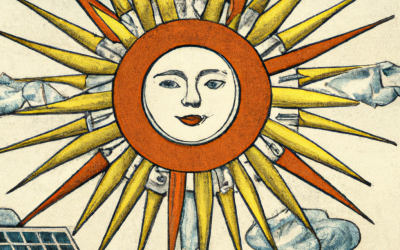Frontier Centre: It is five years this year since the English-language edition of The Skeptical Environmentalist: Measuring the Real State of the World was released. Looking back, are you surprised by the controversy it caused?
LOMBORG: I was probably surprised by the fact that it generated so much attention, and so much irritation, when I was saying that actually a lot of the things we are doing to the environment are making it better. I would have imagined that a lot of people would applaud that. Not to mention the fact that it’s true. But we also had had the same discussion in Denmark, and many people were up in arms when we had the discussion then. And that way I kind of knew that you really have to realize that people also have very strong emotions in this area, and that for some reason we have come to believe that it is almost crucial to believe that things are going in the wrong direction, otherwise we don’t feel comfortable.
FC: Do you think the debate has matured since then?
LOMBORG: I think for a while it really was moving in the right direction and people were understanding the issues and the arguments better. But I think what is happening now is that we are increasingly seeing a tailspin into hysteria over the global warming discussion, where it is almost commonplace to say things are worse than we thought.
It’s at the stage where people are saying its even worse than we thought yesterday, and that it is going to be catastrophic, and chaotic and disruptive – all these kinds of words. This has actually led to one of the lead modellers in the UK to come out and say it’s bizarre that before we had the debate between the climate change skeptics and the scientists, and that now we have the debate between the scientists, who are now becoming the skeptics, and those who are saying it’s all going to end in chaos, when it is going to do nothing of the sort – and this is not what the UN panel is telling us.
Perhaps this is most clear when you look at the movie from Al Gore. Everything he says is technically true. He says for instance that if Greenland melts, sea levels will rise about 20 feet. This is technically true. But of course the very evocative imagery of seeing Holland disappear under the waves – or New York, or Shanghai – leaves the impression that this is all going to happen very soon. Where in fact the UN climate panel says that the sea level rise over the next 100 years is going to be 30 cm – about 20 times less than he talks about. So there is a dramatic difference between what we’re being told and what we’re actually seeing. Which is also why I am writing a new book which comes out next fall on climate change, and I will address some of these issues.
FC: To what extent do you feel global warming overshadowing the debate on other environmental challenges?
LOMBORG: It clearly does. Global warming is an important issue and one which we should address. But there is no sense of proportion either in environmental terms, or indeed in terms of the other issues facing the world.
If you just take the environmental problem first, it’s very clear that what causes by far the majority of deaths is lack clean drinking water and lack of sanitation. Millions of people are dying each year from this. Also taking the new WHO estimates of what really kills people, these are the huge issues.
The second biggest problem is indoor air pollution, which probably kills somewhere between 1 and 3 million people each year, basically because people are too poor to use good fuels and end up using dung or cardboard or whatever they can find. Only a very distant third comes climate change, which the WHO puts at 150,000 to die right now.
This of course ignores those people that are no longer dying from cold-related deaths. For some inexcusable reasons, I would argue, they have the idea that they will only look at things that are going to be bad and don’t have to look at will be good from climate change.
One of the top climate change economists has modelled – and several papers that came out a couple of weeks ago essentially point out – that climate change will probably mean fewer deaths, not more deaths. It is estimated that climate change by about 2050 will mean about 800,000 fewer deaths.
There is a total lack of a sense of proportion about where we are in terms of the environment but also on non-environmental issues, which is of course what I am looking at now with the Copenhagen Consensus, where we try to look at what are the big issues of the world, and where can we do a lot of good, and where can we do a little good. And the bottom line is there are many problems in the world where we can do much more at much lower cost. So presumably, if our goal is to help people, then there are many other things we should do first. If our goal is to help the environment, then there are also many other things we can do first.
FC: Do you think that there are times when policy choices can actually do more harm than good? Are there any past examples of environmental policy that should give us pause?
LOMBORG: The use of DDT is probably the best example of this and its use in the third world was badly mismanaged. DDT is not dangerous to humans, but it is dangerous to some animals. So if you’re in a rich country where you have malaria under control, clearly you should ban DDT or severely restrict its use.
But our concern about DDT in the early 70s basically meant that most of the developing world restricted their use as well. That was probably an immensely bad judgement because yes, it harms animals like birds, but it also saves human lives. These actions undoubtedly led to many millions of lives lost. So that is one example of where we need to be very careful about what we do.
But I think we are doing a little bit the same thing with climate change discussions right now. We have spent so much time over the last 10 years trying to do something about climate change. We have a treaty that will essentially do nothing whatsoever about climate change and it will still end up costing us quite a bit. And you’ve got to ask yourself, couldn’t we have spent that amount of time and effort and consideration on addressing some of the issues in the world where we could have done an enormous amount of good?
So if we stand back, as Al Gore asks us to do, and look at it from the coming generation’s point of view, they are going to ask ‘what were they thinking?’ They tried to do a tiny little bit about climate change at a fairly high cost, but have done very little good, whereas there are many other problems that they could have tackled that would have left a much better world behind.
FC: Is there anything you wrote in “The Skeptical Environmentalist” that you now think was wide of the mark, or that you would change?
LOMBORG: I would so much rather be able to answer yes, there are some things that were wrong, because it somehow seems a little more reasonable. But not really, no. However, it is important to remember that when “The Skeptical Environmentalist” came out in English it was already the result of a Danish debate and a Danish book. So in a sense it had already gone through many rounds of discussion and debate by 2001.
FC: Thank you for your time.
LOMBORG: Thank you.


